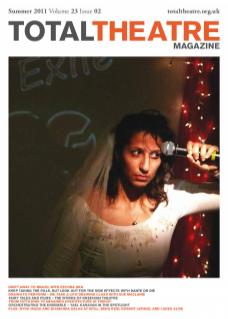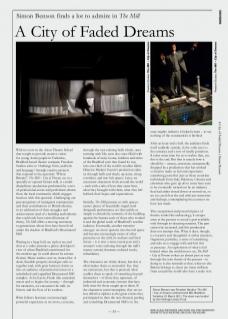With its roots in the Asian Theatre School that sought to provide creative vision for young Asian people in Yorkshire, Bradford-based theatre company Freedom Studios aims to ‘challenge form, aesthetic and language’ through creative projects that respond to the question: ‘Whose Britain?’. The Mill – City of Dreams, set in a specially re-opened former mill, is a multidisciplinary production performed by a mix of professional actors and performers drawn from the local community which engages head-on with this question. Challenging our preconceptions of immigrant communities and their contributions to British identity, in its celebration of their struggles and achievements (and of a building and industry that could only have existed because of them), The Mill offers a moving testimony to generations whose lives have been lived under the shadow of Bradford’s Drummond Mill.
Waiting in a large hall, we sip hot tea and chat as a video presents a glossy developer’s view of urban Bradford transformed for the modern age (it could almost be science fiction). Music washes over us, trance-like. A sleek, Swedish property developer calls us together and, with great humour, forms us into an audience of potential investors in a refurbished and yuppified Drummond Mill complex. As he leaves, Frank (the caretaker) enters and so begins the journey – through his memories, we encounter the mill, its history and the lives of its workers.
What follows becomes an increasingly powerful experience as we move, en masse, through the vast echoing halls which, once teeming with life, were also once filled with hundreds of noisy looms, bobbins and miles of the Bradford yarn that found its way into one-third of the world’s woollen fabric. Director Madani Younis’s production takes us through halls and sheds, up stairs, along corridors, and into loft spaces. Later, we encounter characters from around the world – each with a tale of how they came here, what they brought with them, what they left behind, their hopes and expectations.
Initially, The Mill presents us with spaces: cameo pieces of beautifully staged (and designed) performance art that enable us simply to absorb the enormity of the building against the human scale of those who worked it and the global reach of Bradford’s woollen industry. Eventually, another narrative emerges: we move upstairs into the loft space and become increasingly aware of other pressures on the mill, its workers and their future – it is now a more recent past and a woman’s voice (echoing through the mill’s tannoy system) threatens reduced weeks, redundancy.
The characters are thinly drawn, but this is what makes them so successful. Yes, they are caricatures, but that is precisely what enables them to speak of something beyond themselves – of those they represent, of industrial and economic systems that have little time for those caught up in them. If the characters seem incomplete, they are no less effective ciphers to the great events they participated in than the now disused, peeling and crumbling Drummond Mill is to the once mighty industry it helped create – to say nothing of the communities it birthed.
After an hour and a half, the audience finds itself suddenly outside, in the cold, next to the entrance and a row of smelly portaloos. It takes some time for us to realise that, yes, this is the end. But that is exactly how it should be – uneasy, uncertain, unexpectedly dropped by a production that has worked so hard to make us feel and experience something powerful. Just as those countless individuals from Italy, Pakistan, Ukraine and elsewhere who gave up all to come here were to be eventually turned out by an industry that had either closed down or moved on, so we too are left at the end with just memories and feelings, contemplating the journeys we have just made.
This exceptional and powerful piece of theatre works like archaeology, it scrapes away at the present to reveal a past available only through its decaying remains. The past cannot be recreated, and this production does not attempt that. What it does, though, is evocative and thoughtful: it offers absences, fragments, partiality, a sense of something, and asks us to engage with and feel this as presence. An exploration of what is left behind when the world moves on, The Mill – City of Dreams evokes an absent past as seen through the torn shreds of the present – in doing so it also reminds us that, whoever else Britain belongs to, there are many millions from around the world who have a stake in it.
Simon Benson saw Freedom Studios’ The Mill – City of Dreams at Drummond Mill, Bradford, Yorkshire 31 March 2011. The show was funded by the Heritage Lottery Fund.

